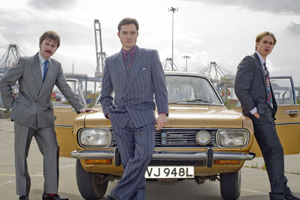Damon Beesley and Joe Thomas interview
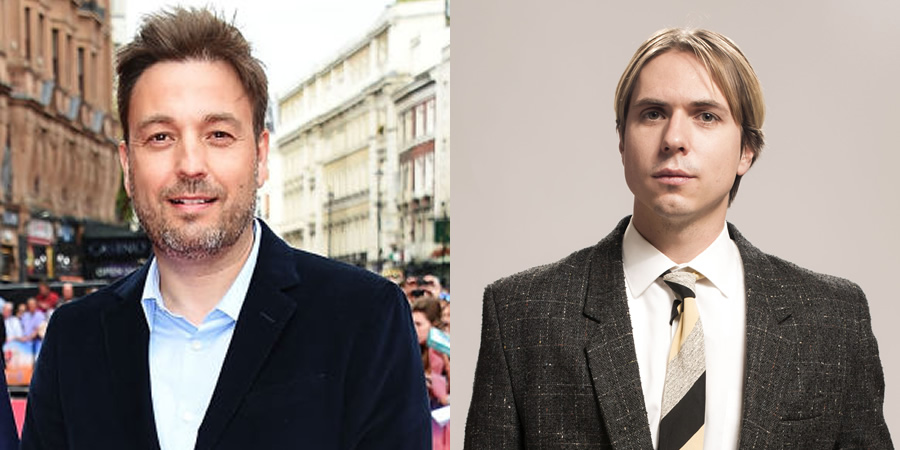
Damon Beesley, co-writer of The Inbetweeners, has created White Gold, a new sitcom about double-glazing salesmen operating in the financial boom of early-1980s suburban Essex. It features Inbetweeners Joe Thomas and James Buckley as hapless Martin Lavender and cocky Brian Fitzpatrick, with Gossip Girl star Ed Westwick as alpha male senior salesman Vincent Swan.
We sat down with Beesley and Thomas to talk about this new show.
Damon, The Inbetweeners was famously based on your own experiences as a teenager. White Gold, on the other hand, has been inspired by your Dad...
Damon: My dad was a kind of jumping off point, because he was a double glazing salesman, so I got to see that world.
I thought about that period of his life; he went from working in this very industrial job to starting selling windows. It was a new industry in those days and he was very good at it and he ended up making a lot of cash early on. Our minimum wage family had cash suddenly flowing in... He was buying extravagant cars, all sorts.
I remember going down to this showroom as a kid after school and seeing the salesmen sitting around smoking and drinking coffee and taking the piss out of one and other, and generally not working. I remember the whole scene being quite intoxicating... a bit like the sixth form common room was when we wrote The Inbetweeners. It was something that stuck with me as a very interesting world of comic potential.
The characters in the show are salesmen in the 1980s: but they're having success, kind of the opposite of the Trotters in Only Fools And Horses. Was that show in your mind at all?
Damon: Not really. I loved Del Boy growing up, but I think Vincent is much more complex and dark a character, because he is completely driven by his needs. What I think they share in their DNA is that entrepreneurship; that kind of ambition, to better themselves. I think Vincent's takes him to some quite dark places though.
When I was growing up, the characters that resonated a bit more, in terms of Vincent, for me were the Arthur Daleys and the JR Ewings. They were heroic villains really, who we bizarrely used to root for... even though Arthur was always ripping off Terry and his friends. There was something about the spirit of the age in the 1980s that that was sort of considered almost intrinsically funny.
In terms of influences, I'm a huge fan of [comedy writer] John Sullivan and all of his shows. Joe wrote one of the White Gold episodes, and I made him sit down and watch episodes of Dear John.... John Sullivan was so prolific. He had Dear John..., Only Fools And Horses and Just Good Friends out at about the same time, if I remember rightly. I can't imagine writing those three massive hit shows almost back-to-back during the same period. They're all so relatable and warm.
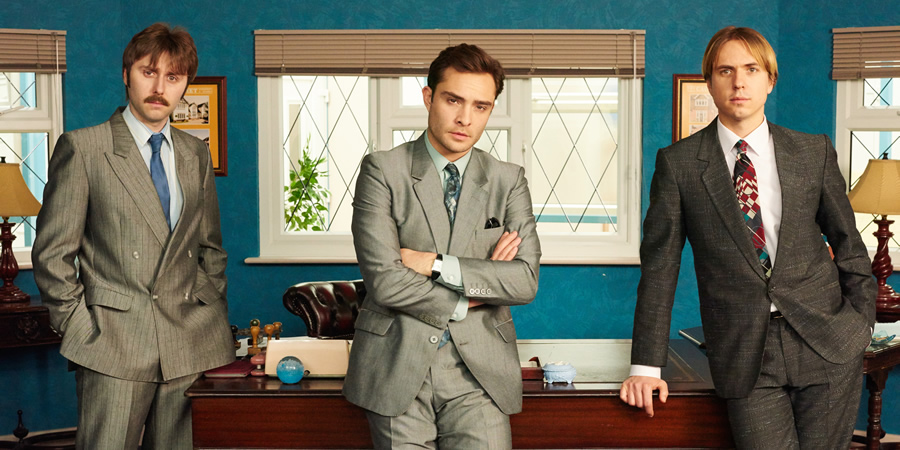
Joe, how did you come to write an episode?
Joe: Damon kindly asked me, as I've done a little bit of writing. I co-wrote Chickens which was on a few years ago, so I had a little bit of experience. Chris Niel wrote Episode 5, I wrote one, and Damon wrote the rest.
I've always tried to follows the writers in my career, more than anything else. The Inbetweeners, then Fresh Meat with Sam Bain and Jessie Armstrong - they are all brilliant writers. I certainly aspire to do more writing in the future. It was just a great opportunity and the world felt very ready and well fleshed out, and it was pretty easy just to jump straight in to it.
Damon: Joe's being very humble. It was a total no-brainer, because I wanted Joe to be in it, I wanted to have a small writing room and Joe is one of the most brilliantly funny people I've ever met. He had already written two scripts for our company, Fudge Park, which were brilliant, so it was natural that he'd write on it, and it was a great choice.
Chris Niel too. He is the creator and writer of Free Agents - the Sharon Horgan and Stephen Mangan sitcom on Channel 4, about two agents falling in love. He's another brilliant writer who we have always worked with. I felt like it was a good team, I think we sort of spanned the decades. Chris remembers the 80s a little bit more than I remember the 80s, and Joe remembers the 80s... well, zero! He was barely alive!
Joe: The 80s were in my rear view mirror. I was very much a child of the 1990s and the 80s were very much considered ancient history, when actually it was quite recent history really. It is interesting, I don't think of 2007 as absolutely irrelevant today, whereas I think in 1995 I probably thought '1985 might as well be a million years ago'.
I grew up in Essex in the 90s, when the transition that's the basis of White Gold had already happened. I suppose the show, to some extent, charts the emergence of what would later be called 'Essex Man', sort of a brash and confident person driven by money. It's interesting to think that I didn't witness that, but was very much living in a world that was a product of that.
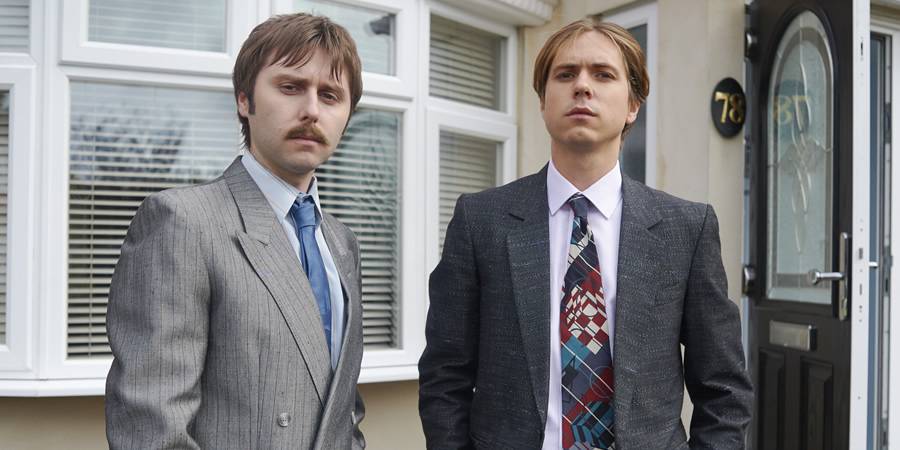
Damon, did you have Joe and James already in mind to star in White Gold when you started writing?
Damon: This harks back to the topic we started on, John Sullivan. I remember once watching a documentary about Only Fools And Horses and they were talking about the character of Boycie and - I might be libelling the estate of John Sullivan here - but I'm pretty sure I remember him saying that he'd seen John Challis do a character on stage that was brilliant, which was effectively Boycie... so he'd seen that character and he just wanted that in Only Fools. I'm sure he was being was very humble about his own creation, but that was sort of a jumping off point for the characters of Fitzpatrick and Lavender too...
Vincent is a different comedic character than we've seen in British comedy for a while because he's brash and arrogant and I think I wanted to have a very strong foundation double act with him in the showroom. Maybe for my own safety and comfort. So having Fitzpatrick and Lavender - James and Joe - in mind helped me shape those two characters into the characters that are presented on the show.
So, yeah, they were very much in mind I think. But it's very rare to have that chemistry anyway... it's not a bad way to do it; work back from your performers.
It wasn't just that though, they both lived in Essex. They understood when I told them about the Essex of my youth and how I wanted these characters to be ambitious and not play up [the stereotype]. The Essex of TOWIE is not the Essex I remember growing up in. It wasn't people wearing how stupid they are on their sleeve as a badge of pride. People were very aspirational and wanted to better themselves.
Maybe everyone has a childhood like this, but I remember it as a sunny place where I was growing up and it was fun. You go back to the towns now, and they're very similar actually, but they're not quite as on-the-way-up as they were then. We were in a boom really. A weird bubble in the South East. I've basically written Britain's first pro-Thatcher comedy! Ha ha.
Joking aside, the Thatcherism element was always part of the back-story of White Gold. It was a Thatcherite policy to let people buy their own council houses, which stimulated this boom in the housing market that gave this huge shot in the arm to the double-glazing industry that was just emerging. People were making a lot of money out of working class families who were trying to better themselves. The sort of era of yuppies and upward progression.
It's a nice way to reflect that era, and reflect something was happening in the South East that was different from the story that was going on in the rest of the country: in the North East and North West and the mine closures. It was equally as damaging in its own way to the fabric of those small towns, as people were becoming very individualistic and focusing on themselves and ripping of their neighbours and friends with expensive windows they didn't need... That's the kind of more pretentious back-story that keeps my writer's soul alive!
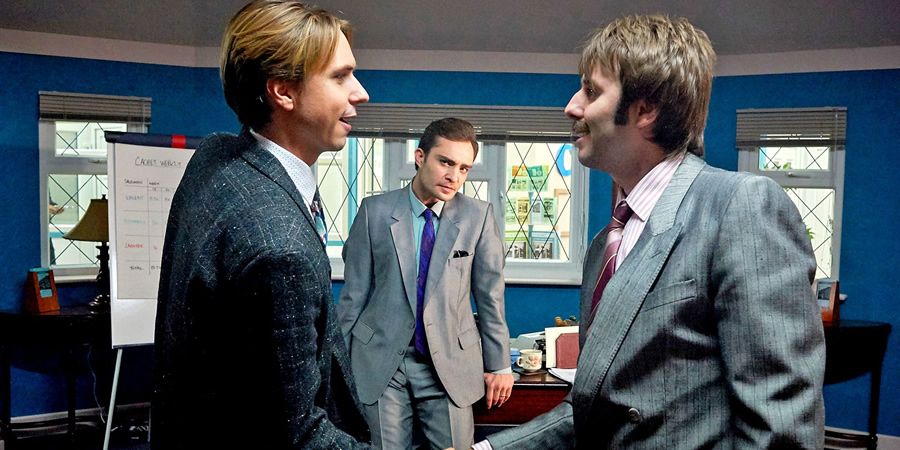
Joe, your character - Martin, a slightly ineffectual salesman - looks a lot of fun to get into?
Joe: Yeah, it was great. I really like his back-story, in that he's had a music career. I think bands are just inherently funny. I think the idea of Martin Lavender being this guy who sort of had a shot at the big time and blew it, and is now doing this job, is great.
He has a very different attitude to it to the other two guys in the showroom, for whom I think it really is just a way of boosting their egos. For him I think the job actually is diminishing his ego and he's bad at it. He's chosen to do a job that he's bad at, which is dysfunctional I would say. Doing something you don't want to do out of choice is an interesting one.
He gets to pour cold water on some of the grandstanding of Fitzpatrick and he gets to be the one who can kind of undercut the pomposity of the banter in the showroom. On top of that, it's nice to do something period. 1980s clothes are kind of hilarious! It was really fun and nice to be around James as well, who I think I have developed great chemistry with over the years.
We spoke to James recently on the set of Zapped, which he is filming the next series of at the moment. He said he's asked constantly about more Inbetweeners. How do you prepare your existing fans for this show?
Joe: I think that, within comedy, there tends to be a bit of a tradition of actors and writers working together on different projects and there being a continuity there, even if it's not a continuity of the project. So hopefully that will happen here. I really want people who like The Inbetweeners to watch this because they like us and Damon, but at the same time we obviously want to take them somewhere new and do stuff in this show that you couldn't do in The Inbetweeners. That show was about teenagers but this is about adults and families and it's therefore opening up new source material.
I think one of the things about The Inbetweeners is that we covered a lot of ground - I think Damon and [co-writer] Iain Morris were running out of memories by the end, ha ha - so you need to break in to a bit of new territory... but hopefully we go into that with the same kind of comedic attitude, and hopefully the same kind of the qualities.
Damon: I think you can't escape your own voice. I tried for a while. I wrote The Inbetweeners with Iain - so if they don't like this, they should obviously heap all the praise on him! Ha ha. There's always that danger. But Iain has been involved as an executive producer, it's just this felt very personal to me and something I always wanted to write.
I do think it is a completely new comic universe though. Lavender and Fitzpatrick aren't grown up versions of Jay and Simon, I think they're different men and they have different priorities, but there are always going to be notes and flavours from The Inbetweeners. Comedy is just about voices I think. For me, it's always about writers' voices and performers' voices and when they're strongest, they seem to resonate.
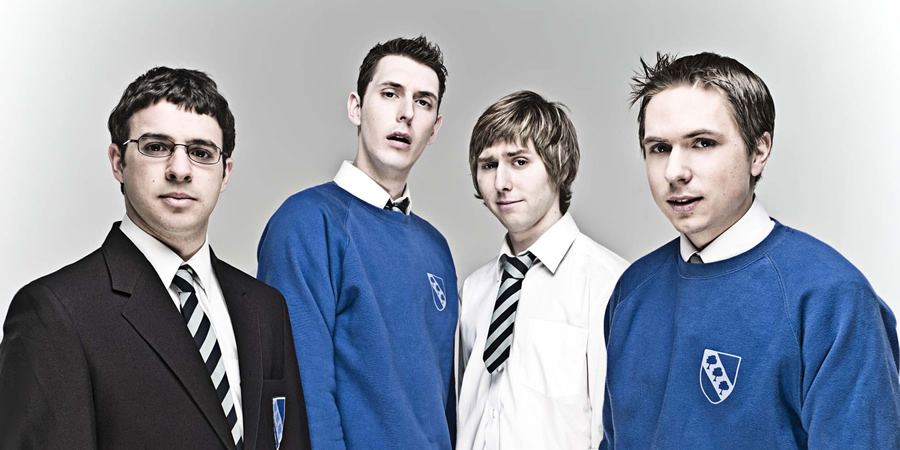
Damon: I actually went into White Gold thinking I'd written a comedy drama; I think that was a self defence mechanism. I'd pitch it as a comedy drama because I was thinking 'well, it won't be as funny as The Inbetweeners', but actually, when it was finished, it is definitely a balls-out comedy. It's got dramatic moments in it, but it's a proper comedy and I'm really proud of it for that reason.
I don't think anything we're doing here could be as funny as The Inbetweeners - not that I'm sating it's the funniest show ever - just in terms of the pure joke delivery. That show had a great joke-delivery-weapon-system. You've got four teenage boys who can say almost anything and nobody really censures it.
Joe: Yeah. Almost their only priority, as teenage boys, was to try to get a laugh. Life for teenage boys is quite empty, apart from the banter that they have with their mates. It wouldn't be realistic for adult men to be constantly doing all of that as well, as they're also trying to do other things like have jobs and have families. But hopefully that's a positive thing.
Damon: I think so, the ambition for this is grander in visual style. I was struggling a bit with the storytelling side of things and the film that opened it up for me a bit was The Wolf Of Wall Street. Martin Scorsese is my favourite director. I watched that and I just thought 'yeah, of course, you lean into it'. There's so much story to cover that you need to have something equally cinematic, almost as a visual style, to tell this story and make it feel exciting and glamorous. That was helpful.
This is the first series I've ever directed so it was always in my mind as I was writing it that it was going to feel very and look very different than The Inbetweeners. However, when I got into the edit suite and watched the first cut, I thought 'oh it does feel a bit like The Inbetweeners'... so you can't escape yourself, I kind of learnt.
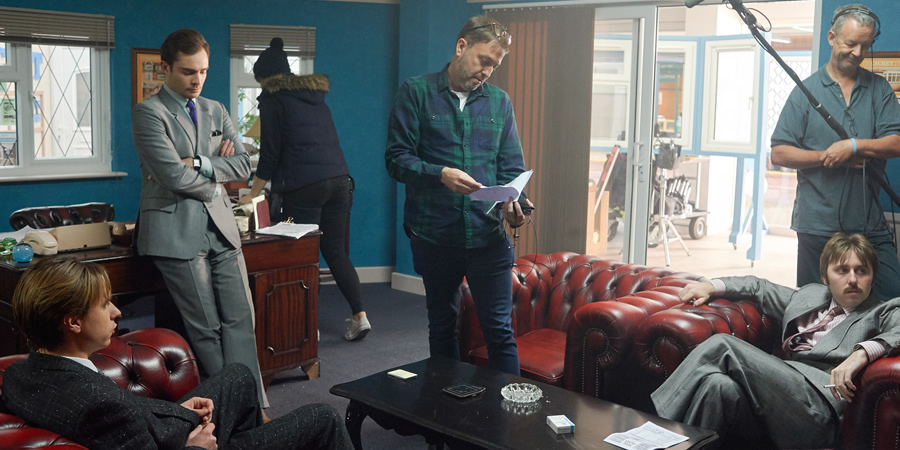
Was it a challenge writing and directing alone, rather than with Iain?
Damon: Yeah, it was. I got to write with Joe and Chris. That part was fun. The next part where we went away and wrote our own scripts, I'd not done that before without Iain so I found that really, really difficult.
The directing was the bit I was most scared of, because I'd only directed with Iain. When that started, I suddenly realised actually that it is very enjoyable, because you don't do it on your own, it's such a collaboration. You've got actors, you've got heads of department - wardrobe, art, make-up - it's such a team and you're like 'oh, this is great, I like this'.
I actually really enjoyed directing much more than I was expecting to. It was the bit where I felt I'd be the most isolated but actually it was almost the most fulfilling part of it. It turns out the writing is, and will always be, the bottom of the enjoyment pile!
What's next for you both then?
Joe: I've got a couple of scripts in with Fudge Park. They are still things I'm kicking around. I've got a kind of autobiographical style thing that is probably fairly generic, but is something. It's my 'one of those things where you sort of write about your own life a bit'. These are scripts that I kind of have on the back-burner to some extent! I may be doing a film. Er, Damon, am I alright to talk about that?
Damon: Let's just say we've got some exciting film news coming up. I don't know that we can announce it right now, but it's not far away. We're going to be going into production on a film this year, but we can't tell you everything about it right now.
We [Fudge Park] have got a film deal with Film4 and Entertainment Film Distributors, and the first film from that slate of four films is the one we're about to push the button on and announce. But I'm embargoed until a few weeks from now.
Joe: That was such a washout of an answer, sorry. "I've got something I can't talk about and stuff I'm doing so slowly that it's not a thing yet."
Ha ha. It does look to be a busy time for Fudge Park...
Damon: Yes, Fudge Park have a lot going on at the moment. We've got a few things in development. We can't talk about them all yet, but one thing we're working on is with #HoodDocumentary star Kayode Ewumi - who is in Episode 6 of White Gold actually. He's written a new character and scripted piece for BBC and we're doing a read through of that that, which we're all quite excited about.
There's a few other things in development too. First up is Ill Behaviour [Sam Bain's comedy series about a man diagnosed with cancer]. It's not scheduled yet, but it's coming up. It's delivered and it's looking great and we're really excited about that.

